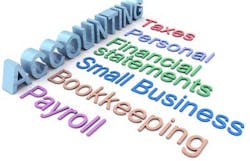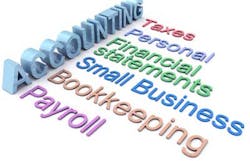Top 4 dental bookkeeping mistakes that could cost you thousands
Nothing will cripple a growing dental practice faster than having cash flow trouble. Simple bookkeeping mistakes can cause a ripple effect that result in severe financial problems. Most dentists are experts at their craft. They know how to keep teeth healthy. However, most dentists are unaware of the proper steps to create and maintain an accurate bookkeeping system that allows them to understand the true financial health of their business.
Bookkeeping for dentists requires an understanding of the practice as it relates to accounting. Here are the top four common bookkeeping mistakes made by dental practices, and the costly impact it these mistakes can cause.
Profit is the result of revenue less expenses for a certain period of time. Cash flow is the money moving in and out of the business from the beginning of the month to the end of the month. The profitis computed after completing a profit and loss statement. Cash flow is computed after completing the cash flow equation and factoring in accounts receivable, inventory, and depreciation expenses.
2.Accidentally recording transactions in a previous period – The practice should “close the books” on a monthly basis. Closing the books includes reconciling the different accounts, preparing the financial statements, and more. After the books have been closed for the period, transactions should not be entered and changes should not be made for that closed period.
A common and costly mistake is to accidentally enter transactions from a previous period, which results in balance adjustments that don’t match the bank balance or financial reports. If this error goes unnoticed, all future reports, tax documents, and cash figures will be incorrect. This can result in doubling the cost to repair the financials, misrepresentation of cash, or harsh penalties from the IRS.
3.Not using an industry standard chart of account – The chart of accounts is used to track how money is spent or received, and to prepare the financial reports for the practice. When establishing an accounting system, special accounts should be set up and tracked according to dental industry standards. A common mistake made by dentists is to use a general chart of accounts, or having an inexperienced bookkeeper create an incorrect chart. The result of this costly mistake is that when the financial reports are prepared, they will not provide the dentist with the insight needed to streamline and grow the practice effectively.
4.Not working with an experienced dental accountant – Working with an accountant that specializes in dental bookkeeping will ensure an accurate view of the financial conditions of the practice at all times. This guarantees that the practice financial statements are prepared according to the General Acceptance Accounting Principles, the IRS guidelines, and the dental industry standards.
Doing it yourself or hiring an in-house inexperienced bookkeeper can result in costly mistakes. Dentists will notice these mistakes when they receive a high tax bill, theft occurs due to lack of internal controls, there is an incorrect reconciliation of cash and high receivables figure, and there is an inaccurate and unreliable accounting system.
Sound financial management begins with understanding the unique bookkeeping skills needed to effectively operate a dental practice. An experienced accountant can help accurately track dental tax deductions, save time, save money, implement an effective operation system, and provide the dentist with peace of money.
For more information on costly dental practice mistakes, schedule a free consultation today with Smart Accounting Services at [email protected] or 770-783-5214.
ALSO BY OCTAVIA CONNER:Top 4 ways to prevent internal theft in your dental practice


